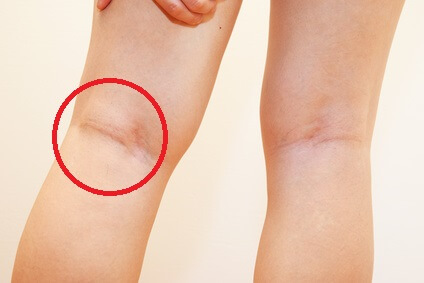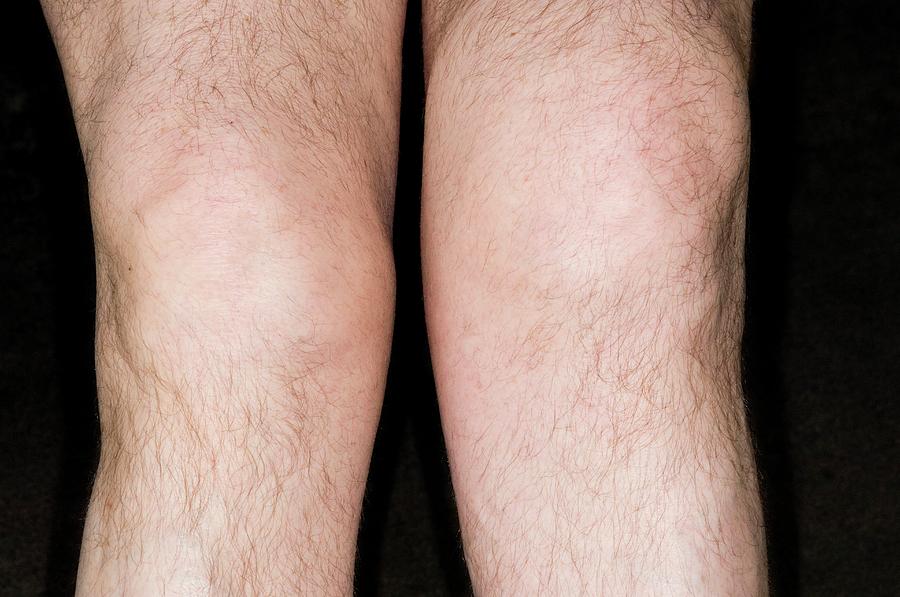Identifying Swollen Knees: A Comprehensive Guide
Swelling in the knee region can be easily identified by visual and tactile cues. Puffiness or a “balloon-like” appearance around the knee joint is a common visual sign. Additionally, the skin around the knee may appear redder or shinier than usual. In terms of touch, swollen knees often feel warm and tight, with a decreased range of motion compared to the healthy knee.
Comparing the affected knee to the unaffected one is crucial for an accurate assessment. Stand up straight and take note of any differences in size, shape, or symmetry between your knees. If you suspect that your knee is swollen, it is essential to determine the underlying cause, as this will influence the appropriate course of action.
Potential Causes of Swollen Knees
Swollen knees can result from various factors, ranging from minor injuries to severe medical conditions. Common causes include injuries such as sprains, strains, and fractures, which can lead to fluid accumulation in the knee joint. Infections, such as cellulitis or septic arthritis, may also cause knee swelling.
Medical conditions, such as arthritis and gout, can also contribute to knee swelling. Osteoarthritis, the most common form of arthritis, causes cartilage breakdown and fluid buildup in the knee joint. Gout, a type of arthritis characterized by uric acid crystal deposits, often affects the big toe but can also impact the knee joint, causing pain and swelling. Bursitis, or inflammation of the fluid-filled sacs that cushion the knee joint, can also result in knee swelling.
It is essential to understand the underlying cause of knee swelling to ensure appropriate treatment. If you suspect that your knee is swollen due to an injury or infection, seek medical attention promptly to prevent further complications.
When to Consult a Medical Professional
In some instances, knee swelling may indicate a severe underlying condition, necessitating prompt medical attention. Consult a healthcare provider if you experience severe pain, inability to bear weight, fever, or visible deformity. These symptoms could indicate a serious injury, infection, or medical condition that requires immediate intervention and diagnosis.
Additionally, if your swollen knee does not improve after several days of home treatment or if the swelling worsens, seek medical advice. Persistent or worsening symptoms may indicate a more severe issue that necessitates professional treatment.
Early intervention and diagnosis are crucial for ensuring the best possible outcome and preventing further complications. By understanding when to consult a medical professional, you can take proactive steps to protect your knee health and overall well-being.
Home Remedies and Self-Care Strategies
If you have a swollen knee, there are several home remedies and self-care strategies that you can employ to alleviate discomfort and reduce swelling. Rest, ice, compression, and elevation (RICE) are effective methods for managing knee swelling.
Rest the affected knee by avoiding strenuous activities that exacerbate pain and swelling. Instead, opt for low-impact exercises, such as swimming or cycling, that promote knee mobility without causing further damage.
Ice the affected area for 15 to 20 minutes every two to three hours for the first 48 to 72 hours. Applying ice to the swollen knee can help reduce inflammation and numb the pain.
Compression can also help minimize swelling by reducing blood flow to the affected area. Wrap the knee with an elastic bandage or compression sleeve, ensuring it is not too tight, as this can restrict circulation.
Elevating the knee above the level of your heart can help reduce swelling by promoting fluid drainage. Prop your leg on a pillow or cushion while sitting or lying down.
Over-the-counter pain relievers and anti-inflammatory medications, such as ibuprofen or naproxen, can also help alleviate pain and reduce swelling. However, consult your healthcare provider before taking any medication, especially if you have underlying health conditions or are taking other medications.
Preventing Knee Swelling: Tips and Recommendations
Taking proactive measures to prevent knee swelling can help ensure long-term knee health and reduce the risk of injury or medical conditions. Consider the following tips and recommendations:
Maintain a Healthy Weight: Excess weight can put additional pressure on the knee joint, leading to swelling and pain. By maintaining a healthy weight, you can reduce the risk of knee swelling and other related health issues.
Engage in Regular Exercise: Regular exercise can help strengthen the muscles surrounding the knee joint, providing additional support and stability. Low-impact exercises, such as swimming, cycling, or using an elliptical machine, can help improve knee mobility without causing further damage.
Practice Proper Lifting Techniques: Improper lifting techniques can strain the knee joint and lead to swelling. Always lift objects with your legs, keeping your back straight and avoiding twisting or bending your knees excessively.
Warm Up and Stretch Before Physical Activity: Warming up and stretching before engaging in physical activity can help prevent knee swelling by preparing the muscles and joints for movement. Start with light cardio exercises, such as brisk walking or jumping jacks, followed by dynamic stretches that mimic the movements of your chosen activity.
Stay Hydrated: Proper hydration can help reduce inflammation and swelling in the body, including the knee joint. Aim to drink at least eight glasses of water per day, and increase your intake during physical activity or in hot weather.
Long-Term Management of Swollen Knees
Managing knee swelling over the long term may require the expertise of medical professionals such as physical therapists, orthopedists, and rheumatologists. These healthcare providers can help diagnose the underlying cause of knee swelling and develop a personalized treatment plan to alleviate symptoms and improve knee health.
Physical Therapy: Physical therapists can provide exercises and stretches to improve knee mobility, strengthen the muscles surrounding the joint, and reduce swelling. They may also recommend assistive devices, such as braces or crutches, to provide additional support and stability.
Orthopedic Specialists: Orthopedic specialists are medical doctors who specialize in diagnosing and treating musculoskeletal conditions, including knee swelling. They may recommend treatments such as corticosteroid injections, joint aspiration, or surgery to alleviate symptoms and improve knee function.
Rheumatologists: Rheumatologists are medical doctors who specialize in diagnosing and treating autoimmune and inflammatory conditions, such as rheumatoid arthritis. They may recommend medications such as disease-modifying anti-rheumatic drugs (DMARDs) or biologics to manage inflammation and reduce knee swelling.
Corticosteroid Injections: Corticosteroid injections can help reduce inflammation and alleviate pain in the knee joint. However, they are typically used as a short-term solution, as long-term use can lead to side effects such as joint damage or thinning of the skin.
Joint Aspiration: Joint aspiration, also known as arthrocentesis, involves removing fluid from the knee joint using a needle and syringe. This procedure can help reduce swelling and alleviate pain, and the fluid may be sent to a lab for analysis to help diagnose the underlying cause of knee swelling.
Surgery: In some cases, surgery may be necessary to alleviate knee swelling and improve joint function. Surgical options may include arthroscopy, partial or total knee replacement, or ligament reconstruction.
Living with Swollen Knees: Coping Strategies
Living with swollen knees can be challenging, but there are several coping strategies that can help you maintain a positive quality of life. Here are some tips to consider:
Explore Assistive Devices: Assistive devices, such as knee braces, crutches, or canes, can help alleviate pain and reduce the risk of further injury. Consult with a healthcare provider to determine which devices may be appropriate for your specific needs.
Modify Daily Activities: Modifying daily activities can help reduce stress on the knee joint and alleviate swelling. For example, consider using a stool or chair when cooking or washing dishes, or use a rolling cart to transport heavy items.
Seek Support: Connecting with friends, family, or support groups can provide emotional support and practical advice for living with knee swelling. Consider joining online forums or support groups to connect with others who are experiencing similar challenges.
Maintain a Healthy Lifestyle: Engaging in regular exercise, maintaining a healthy weight, and practicing proper lifting techniques can help prevent further knee swelling and improve overall knee health.
Prioritize Rest: Getting enough rest and avoiding overexertion can help reduce knee swelling and alleviate pain. Consider prioritizing rest and relaxation activities, such as meditation, yoga, or gentle stretching.
Myths and Misconceptions about Swollen Knees
There are several myths and misconceptions surrounding knee swelling that can lead to confusion or improper treatment. Here are some common myths and misconceptions to be aware of:
Myth: Rest is the Only Treatment for Swollen Knees While rest can help alleviate pain and reduce swelling, it is not the only treatment option. Other home remedies, such as ice, compression, and elevation, can also be effective. In some cases, medical treatment may be necessary to address the underlying cause of knee swelling.
Myth: Swelling Always Indicates a Severe Injury While knee swelling can be a sign of a severe injury, it can also be caused by minor injuries or other factors, such as inflammation or fluid buildup. It is essential to assess the severity of the swelling and any accompanying symptoms to determine the appropriate course of treatment.
Myth: Knee Swelling Will Go Away on Its Own In some cases, knee swelling may resolve on its own with rest and home remedies. However, if the swelling persists or is accompanied by severe pain, fever, or inability to bear weight, it is essential to seek medical attention to address the underlying cause.
Myth: Swollen Knees Cannot Be Prevented While not all cases of knee swelling can be prevented, there are several steps you can take to reduce your risk. Maintaining a healthy weight, engaging in regular exercise, practicing proper lifting techniques, and warming up before physical activity can all help prevent knee swelling.







